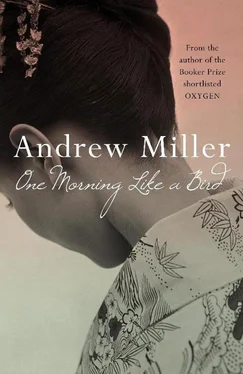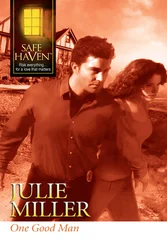Lying there, he is starting to feel pleasantly fatigued again. There is, he assures himself, plenty of time before tomorrow to think of some excuse, some unavoidable commitment he forgot somehow to mention to her. My sincere apologies . . Most awkward . . Most unfortunate . . Another occasion, perhaps? She, who seems to so admire all things Japanese, and who doubtless subscribes to the curious Western theory of Oriental inscrutability, might enjoy a little demonstration of it. He will hide from her in language. He will conceal himself in a smoke of impeccable manners. It would, after all, require nothing more difficult than a passable imitation of Father.
He leaves for the house in Kanda a few minutes after four o’clock. He rides his usual route, but being ill has stripped him of a layer of skin so that the sudden flights of sparrows, the singing of tram cables, sunlight in a gutter, the whiff of, what? — spring mushrooms? — startles and amuses him, diluting a little the exasperated mood he has been in all day, the sense of having been burdened by a ridiculous commitment he has been too dull, too timorous to escape from. His hope now is simply to persuade her to give up the kabuki and come to the cinema instead. There’s a Marcel Carné film at the Montparnasse in Asakusa. He could buy her a coffee, perhaps an ice cream, get her home by nine. If she becomes tedious, argumentative, starts to lecture him on the traditional arts of Japan, he can cough into his sleeve and let go a few deep sickbed sighs. Even Alissa must understand that.
He props his bicycle by the drainpipe, folds his raincoat over his arm, rings the bell. Hanako answers. ‘The master isn’t here,’ she says.
‘Ah . .? But Miss Feneon?’ He would like to add, ‘She called me.’ He would like even Hanako to know he has not simply taken it upon himself to ring the bell without a proper invitation, but before he can speak she has stood aside to let him enter.
He follows her through the house to the kitchen door, the only door — some quirk of Russian architecture? — that gives onto the garden. She stands aside again, stares at him, then drops her gaze. Alissa is under the magnolia tree, reaching into its lower branches, apparently to inspect the buds that line the wood like so many creamy-white candles. For a moment he observes her in silence, her braided hair, her rose kimono tied with an obi of the deepest indigo. Then Beatrice barks and runs over the grass to greet him, sitting at his feet and gazing at him with moist, adoring eyes.
‘She thinks you’ve got something for her,’ says Alissa. ‘She thinks you’re Junzo.’
‘I don’t,’ says Yuji, who thinks it not quite right that a dog should be fed sweets like a spoilt child.
‘I’m sure she likes you anyway,’ says Alissa, taking her stick from where she has hung it over a branch. ‘She’s very forgiving.’
‘Monsieur Feneon isn’t here?’
‘No,’ she says. ‘I told you on the phone, didn’t I? He’s in Yokohama.’
‘Yokohama?’
‘He can’t be here all the time.’
‘Of course.’
‘He has a business to attend to. I’m sorry if you are disappointed.’
He says he is not. They look at each other. Already, he thinks, it’s started, the long evening of embarrassment, but when they go into the house to drink tea she starts to play the hostess, asking him, earnestly, about his health, gently scolding him for not wearing a kimono, and does it all so skilfully, in such a grown-up manner, he is, despite himself, put at ease. The stance he has imagined himself taking, the tone of vexed politeness, has no opening, no chance to emerge. When he tries to say something sarcastic about the failings of student theatricals, it comes out as a perfectly harmless enquiry, one she answers at length, with much enthusiasm.
From in front of the house the taxi sounds its horn. Yuji accepts his coat from Hanako and follows Alissa into the street. They settle into the back of the cab. The driver manoeuvres to the main road past a party of schoolgirls on bicycles, and what looks like a neighbourhood shogi competition, a dozen benches spilling into the middle of the street, young and old sitting astride them, leaning intently over the boards.
He settles back against the frayed leather of the seat, looks out drowsily at the traffic, at the sunlight slanting over the roofs, the evening air in which a golden dust seems to hang, suspended. And as they ride — so slowly they will surely be late — something begins in him, an emotion as sweet as it is painful, and that he cannot, in this perfectly ordinary Tokyo dusk, begin to account for. It is as if he was sitting at the side of a piano on which someone was sounding the same deep note again and again, louder and louder, more and more insistently, until his entire body, the blood itself, vibrated at the exact same pitch. If this is memory then it’s memory as possession — but memory of what ? He presses his fist to his lips. Alissa turns to him.
‘I’ve been selfish,’ she says. ‘You are not well yet.’
‘No,’ he says. ‘It’s nothing serious.’
‘Should we turn back?’
‘There is really no need.’
‘You’re sure?’
‘Quite sure.’
‘It’s not far now,’ she says. ‘You’ll feel much better out in the air again.’
The theatre is on the corner of a street by the Tsukiji Canal, close enough to the market for a breeze from the bay to carry with it a small stink of fish and fish guts. Yuji, to give himself more time to recover, insists on paying the driver, then walks beside Alissa to the entrance of the theatre. It is not, despite the brightly painted banners over the doors, a place of any great promise, but once they have left their shoes with the attendant and stepped inside, he sees that it is larger than he had imagined, and has, with its scattering of old posters, the age-darkened wood of its beams, the slight confusion of its architecture, something homely and authentic which, despite himself, his mood, the sense of dislocation it has brought with it, touches him with its charm.
They find Mrs Yamaguchi surrounded by her students. She is wearing a kimono of Omeshi silk, and over it a formal coat marked with the crests of the school. To Yuji, though he is certainly no expert, she has the look of a retired geisha, a former Oka-san, perhaps, from one of the older, stricter houses in Shimbashi or the Yoshiwara. Her eyebrows are razored, her hairline neat as if she still wore a wig, though her hair, with its delicate chain of red coral, is, as far as he can tell, her own. Alissa introduces him. The teacher smiles and says, ‘So you are the poet? How wonderful.’ If she laughed, he would not be surprised to find she had blackened her teeth, like the beauties of Grandmother’s day.
The rhythmic wooden clapping of the Ki begins. The inner doors swing wide. They wish each other a pleasant experience, then join the queues filing into the auditorium. The only illumination comes from the pulsing of a half-dozen naked gas flares along the edge of the stage, an uncertain light that leaves large areas draped in shadow, but it does not take long for Yuji to realise that all the seating is in traditional matted stalls and that there is not a single Western-style chair in the whole room. Was Alissa warned of this? How could such a mistake have been made? He turns, stares back to where Mrs Yamaguchi and her students are already settling onto their knees, adjusting their collars, batting their fans. Are some of them watching him, slyly, waiting to see how the ‘poet’ will manage his little difficulty?
The flares are dimmed. The clapping builds to its crescendo. He leans towards Alissa, clears his throat — there is nothing for it but to guide her, as swiftly as possible, out to the foyer again — but she is speaking to him, saying, ‘Here, in here,’ and they shuffle sideways into an unoccupied stall between the aisle and the raised walkway of the hanamichi . She passes him the stick, then, without the slightest visible difficulty, gracefully even, as though easing herself into a hot bath, she kneels. He takes his place beside her. He is still holding her stick, the warm handle. After a moment he lays it carefully on the mat between them.
Читать дальше












